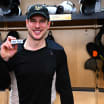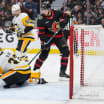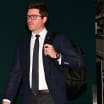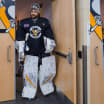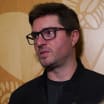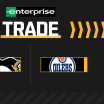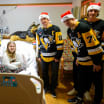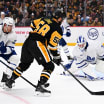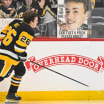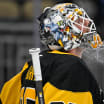One summer, Dana Heinze was working at a hockey school at Providence College alongside the team's equipment manager, Bo Riendeau.
As the camp was coming to an end, Riendeau pulled Heinze into his office, and said, "Dana, I have something for you."
He held out a silver dollar.
"He said, 'Dana, this is your good luck charm,'" Heinze recounted. "You're going to make it to the National Hockey League someday."
Dana Heinze Moves On After 33 Years As An Equipment Manager
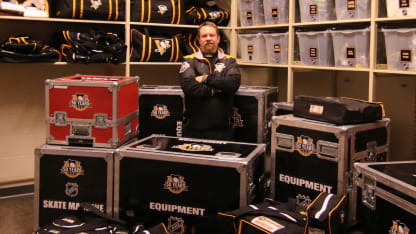
By
Michelle Crechiolo
Penguins Team Reporter
"I started pro hockey in 1988, and it's 2022. That's a good run," said Heinze, 54, who will be honored by the Penguins at a game during the upcoming 2022-23 season. "I've had a blessed career, and at the end of the day, I'm leaving on my own terms."
And in the words of one of Heinze's favorite bands, the Grateful Dead: "It's been a magical, long, strange trip."
There are countless stories from said trip that started back in Johnstown, where Heinze grew up as the son of two schoolteachers. With their background in education, they took somewhat of a critical thinking approach to subjects they didn't know about. So when a young Dana told his dad he wanted to play hockey, "in his infinite wisdom, he said, 'well, hockey is a Canadian sport. We're going to Canada,'" Heinze recalled with a laugh.
"So we packed the family car up and we drove to Montreal. Found this little tiny pro shop in the middle of the city, they outfitted me head to toe with Montreal Canadiens gear, and we drove back."
Heinze, who was a goaltender, played all the way through high school at Westmont Hilltop. They retired his No. 30 jersey a few years ago, which was a gesture that meant the world to him, especially considering how formative that experience was to his future.
"That was really my life for four years in high school," Heinze said. "I was not the best student. I was more into art and photography, and the rest of school really wasn't my thing, which is kind of ironic because my parents were teachers. Hockey was sort of my focus."
When Heinze was at Mohawk Valley Community College (where he was studying advertising, design, illustration and photography) playing a pickup game of hockey one afternoon, he happened to meet the person who was the equipment manager for New Jersey's American Hockey League affiliate, the Utica Devils. His name was Jeff Croop, and he was the one who first got Heinze interested in that side of the business, showing him some of the ins and outs.
After Heinze's college experience, he went back to Johnstown, not sure what to do next. One day, he was at the rink visiting Dave "Ziggy" Ziegler, a mainstay of the local hockey community in Johnstown through his equipment business at the Cambria County War Memorial Arena. Ziegler told Heinze that a new East Coast Hockey League team called the Johnstown Chiefs was coming to the area, and they were looking for someone to help out.
Heinze eventually had a conversation with the head coach Steve Carlson, one of the famed Hanson Brothers from the movie Slapshot, to discuss the opportunity.
"We talked, and he's like, 'well, do you think you're capable of doing this job? Do you have the credentials for this?'" Heinze said. "I was like, 'no' (laughs). And then he said, 'well, you're hired!' That was in 1988-89. That was my very first professional job. I was with the Johnstown Chiefs."
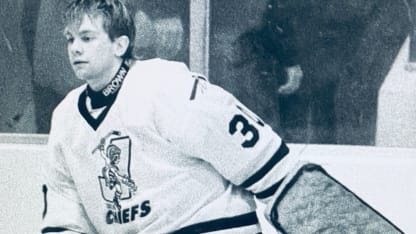
Despite being at the lowest tier of professional hockey, Carlson - who was used to the American Hockey League and had a stint in the NHL as well - was adamant that the staff do everything the right way to the best of their ability.
Back then, before the standardizations of today, home teams were only required to provide the visitors with two bars of soap, 20 towels, two cases of pop, and 20 warmup pucks. That meant on the road, Heinze would spend hours at laundromats with rolls of quarters that Carlson had given him. That's also when Heinze began the tradition of making the locker room feel like home regardless of where the team was, hanging up pictures and sayings.
"Steve said, 'I want it to be as professional as it can be.' So I wanted to treat them like they were in the NHL," Heinze said. "He taught me so much. Having Steve support me and help me and give me his advice… he always told me to be the first one to the rink, the last one to leave. I kind of made that my credo."
During his time with Johnstown, Heinze got the chance to be involved with a couple of those Providence College hockey camps, offered to him by Croop through legendary general manager Lou Lamiorello, as the school was his alma mater.
That connection with Lamiorello, who became a mentor to Heinze, led to his first-ever NHL job. New Jersey's equipment manager J.P. Mattingly called Heinze up and said, "Dana, Mr. Lamiorello talked to me and we're looking for a second equipment manager. Would you be interested?"
And Heinze was, even though it meant having to cut off the long hair he had grown during his hippie phase (though he was still able to embrace that side of him over the years with the music he played in the equipment area throughout the day). So Heinze went to the barber shop before meeting with Lamiorello, who offered him the gig in 1992 following a long conversation over a bowl of wedding soup.
"He taught me attention to detail," Heinze said. "He really is a very good man, and that's something that I'm very proud of, the way that I did my business with the attention to detail. I think it's very important."
Heinze later moved back to Johnstown in 1995 while dealing with an illness, and began a second stint with the Chiefs. After the 1998-99 season ended, Heinze was spending the summer working as a garage door installer, enjoying normal life for a change. That's when Scott Allen, who had taken over as head coach of the Chiefs, phoned to tell Heinze that he had good news and bad news - that he was no longer working for Johnstown because he was going to work in the International Hockey League for the Detroit Vipers, who were an affiliate of Tampa Bay.
Working in a league of that caliber was another incredible developmental experience that helped prepare Heinze for a return to the NHL, which came in 2000 with the Lightning. He was a part of their Cup run in 2004 before coming to Pittsburgh in 2006, with some help from an old friend and fellow Johnstown native. Chris Stewart told Heinze that he had just been hired by the Penguins as their head athletic trainer, and that new general manager Ray Shero was looking for a head equipment manager.
"I'm like, 'you know what? I'm really happy in Tampa.' So a week goes by, and then all of a sudden, Scott Allen calls me,'" Heinze recalled. "He's like, 'are you out of your mind?' I said, 'what do you mean?' He's like, 'Dana, I just heard you had an opportunity to possibly go work for the Pittsburgh Penguins. That's your dream job. What is wrong with you?' I was like 'yeah, I guess you're right' (laughs)."
After Heinze first arrived in Pittsburgh and went into the Penguins locker room at Mellon Arena for the first time, he was overcome with emotion - but not in a positive way. The dressing room was being renovated, so it was a complete mess, and didn't exactly fill Heinze with confidence. From there, he went to go check into his hotel room across the street - but there was no reservation under his name. So Heinze returned to the rink to figure out his next step.
"I went back into the lounge where paint cloths and all of that stuff were down, I'm sitting on a couch and I'm looking around thinking, 'did I make a mistake?'" Heinze recalled. "I started crying, and all of a sudden, Ray Shero comes out and sees me. I told him I thought I made a mistake, and Ray told me I didn't. He said, 'listen, we hired you because we know you can do this, and just know whatever we need to do to get this team up and running in the right direction, you can make it happen.' He made me feel so good. Everything moving forward was amazing with the rest of my long, strange trip."
Heinze went on to establish an incredible standard during his tenure with the Penguins, building on the foundation that had started back in Johnstown and continued on in New Jersey and Tampa.
"As an equipment manager, you're not handed a book," he said. "You just don't get a book that says, 'hey, this is how you do everything.' Everybody's unique in what they do and I think most people who know me realize that I'm a little different than everyone else, and I think that's a good thing."
In addition to always making the dressing room as inviting and comfortable as possible regardless of where the team was, another philosophy Heinze developed was for the equipment staff to always leave a visiting room cleaner than they found it.
"I loved setting up the locker room and setting up on the road," Heinze said. "We'd put up our signs and banners and just make it feel homey. Just being around the guys and making sure they had everything they needed - everybody who worked there, we wanted to make sure everything was first-class. I think we pulled that off, and I'm really proud of that."
Heinze also did a tremendous job of providing Penguins fans a behind-the-scenes glimpse into that entire process. He drew on his art and photography background to share snaps on social media of what went into a day that would often begin at 5:15 AM with sharpening skates and go right back into those early morning hours.
Penguins locker room at the AMALIE Arena in Tampa. pic.twitter.com/rgvhNQ60Nf
— PenguinsEQ (@PenguinsEQ) October 23, 2019
"There's a lot of things that happen throughout the day to get a game off," Heinze said. "So we are so proud when these guys are walking down the tunnel and they're going onto the ice and we know that their skates are perfect, their equipment… everything they need, they have, and we're there for them."
Heinze joked that he won't miss all of the plane rides that come with traveling with an NHL team, as he's always been terrified of flying, but he will miss the people he traveled with.
"All of the players I've been associated with over the years, regardless of whether it was the East Coast League or the IHL or the National Hockey League - I've been so blessed to be around such great people and being part of very classy organizations," Heinze said. "There's no question that I worked hard, spent a lot of hours, and I'm very proud of my accomplishments."
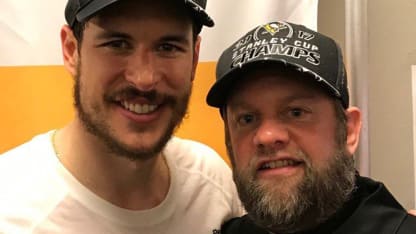
After learning from so many different mentors along the way, Heinze paid it forward with the members of Pittsburgh's current staff, Jon Taglianetti, Paul DeFazio and Danny Kroll. He always described their dynamic as being fingers on one hand, and moving forward, Heinze knows the team is in a terrific spot with that crew.
"The Penguins are going to be in great hands with those guys," Heinze said. "They're going to continue on doing great stuff. I'm honored to say I was a Penguin for 16 years. Now, I think it's time to take on the next journey, which I think is going to be great."







